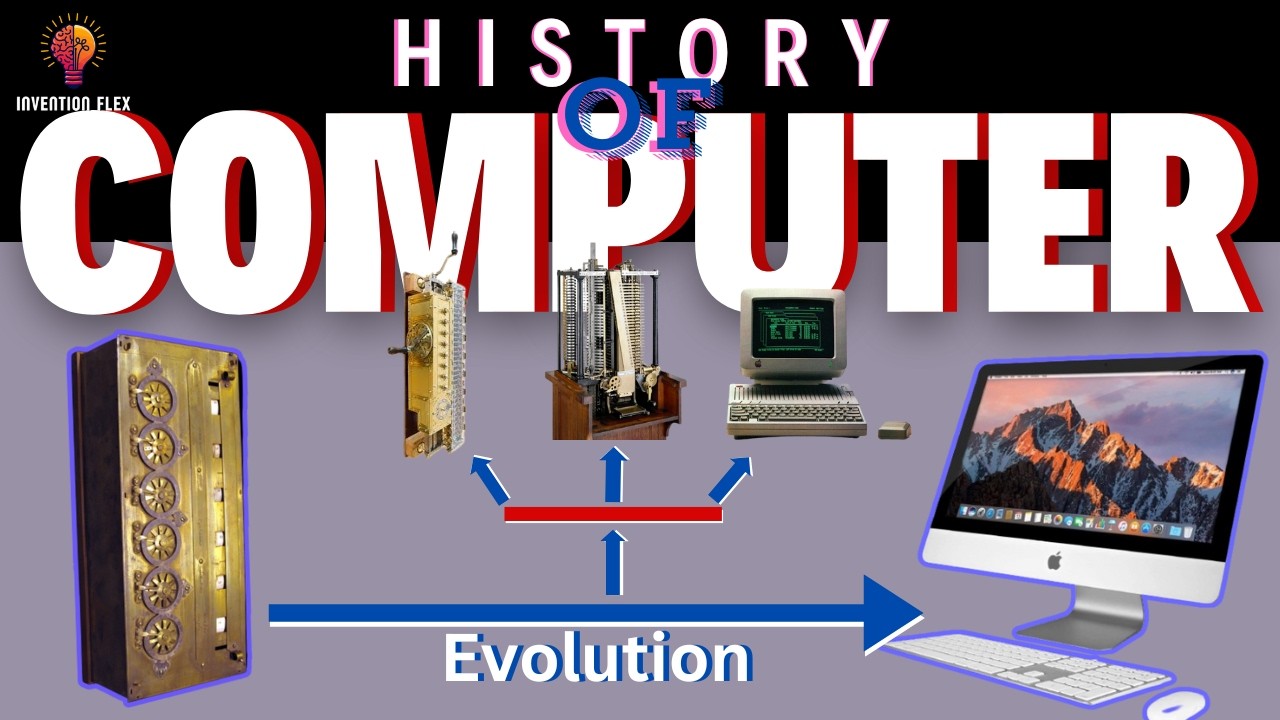History of Computers – How were Computers Invented Short Documentary Video
Summary
TLDRThis video explores the evolution of computers from the abacus to modern devices. It highlights the abacus as the first calculator, the astrolabe for celestial navigation, and Charles Babbage's conceptualization of the first programmable computer. The script details the development of analog computers, the pivotal role of World War II in advancing computer technology, and the invention of the transistor. It discusses the creation of the integrated circuit, the microprocessor, and the impact of personal computers from Apple and IBM. The video also touches on the creation of operating systems, the influence of graphical user interfaces, and the future of computing with quantum computers and beyond.
Takeaways
- 🧠 The term 'computer' has evolved from machines used for calculations to the devices we interact with today.
- 📚 The abacus is considered the first calculator, with origins dating back to 2700-2300 BCE in Mesopotamia.
- 🌌 The astrolabe, used to measure celestial bodies, was crucial for navigation and astronomy in ancient times.
- 🛠️ Charles Babbage's conceptualization of a programmable mechanical computer in the 19th century laid the groundwork for modern computers.
- ⚙️ World War 2 accelerated computer development, with machines like the ENIAC focusing on calculations and code-breaking.
- 💡 The invention of the transistor in 1947 revolutionized computing by offering a smaller, more efficient alternative to vacuum tubes.
- 🔄 The integrated circuit, combining multiple transistors, led to the miniaturization of computers in the 1960s.
- 💻 The Intel 8080 processor, used in early home computers like the Apple II, marked the beginning of personal computing.
- 🖥️ The development of operating systems like MS-DOS and graphical user interfaces on the Macintosh made computers more user-friendly.
- 🌐 The widespread adoption of personal computers and the evolution of operating systems like Windows have made computers an integral part of daily life.
- 🚀 The future of computing holds promise with advancements like quantum computing and potential new materials to further innovation.
Q & A
What is considered the first calculator in history?
-The abacus is considered to be the first calculator, with its origins possibly dating back to 2700-2300 BCE in Mesopotamia.
What was the astrolabe used for and which civilization first referenced it?
-The astrolabe was used to measure the elevation of celestial bodies and was indispensable for sailors to determine their local latitude. The earliest known reference to an astrolabe was from the Hellenistic civilization around the 2nd century BCE.
How did Charles Babbage's programmable mechanical computer work?
-Charles Babbage's design for the first programmable mechanical computer used punch cards to input instructions that the machine would carry out.
What was the differential analyzer and who built it?
-The differential analyzer was an analog computer built by Vannevar Bush at MIT in the 1920s, used to solve complex mathematical problems.
What was the significance of the ENIAC in the history of computers?
-The ENIAC, invented by John Mauchly and J. Presper Eckert, was the first fully electronic and general-purpose digital computer, considered a predecessor to modern machines.
What were the drawbacks of vacuum tubes in early computers?
-Vacuum tubes consumed enormous quantities of power, were unreliable, and required large amounts of space.
How did the invention of the transistor revolutionize computing?
-The transistor, invented at Bell Labs in 1947, allowed for smaller, more reliable, and less power-hungry components than vacuum tubes, paving the way for modern computing.
What is an integrated circuit and what impact did it have on computer development?
-An integrated circuit is a collection of transistors and other components that can be manufactured on a large scale. Its invention led to the miniaturization of computers throughout the 1960s.
Which processor did Intel release in 1974 that was used by hobbyists to build home computers?
-Intel released the 8080 processor in 1974, which was used by hobbyists like Steve Wozniak to build home computers.
How did the creation of the first operating system by Gary Kildall influence the personal computer industry?
-Gary Kildall's creation of the first operating system provided an intermediary between a machine's software and hardware, which was crucial for the development of personal computers. However, when Kildall refused to sell it to IBM, they turned to Microsoft, leading to the creation of MS-DOS and Microsoft's rise to dominance.
What features did Steve Jobs incorporate into the Macintosh from Xerox's research?
-Steve Jobs was inspired by Xerox's research and incorporated a desktop-like screen, mouse, and graphical user interface into the Macintosh, making computers easier to use.
How did the development of computers change from the 1980s onwards?
-From the 1980s onwards, computers found numerous new applications, became portable, and were integrated into various devices like watches, cars, cellphones, and airplanes, becoming an ever-present part of daily life.
Outlines

このセクションは有料ユーザー限定です。 アクセスするには、アップグレードをお願いします。
今すぐアップグレードMindmap

このセクションは有料ユーザー限定です。 アクセスするには、アップグレードをお願いします。
今すぐアップグレードKeywords

このセクションは有料ユーザー限定です。 アクセスするには、アップグレードをお願いします。
今すぐアップグレードHighlights

このセクションは有料ユーザー限定です。 アクセスするには、アップグレードをお願いします。
今すぐアップグレードTranscripts

このセクションは有料ユーザー限定です。 アクセスするには、アップグレードをお願いします。
今すぐアップグレード5.0 / 5 (0 votes)






